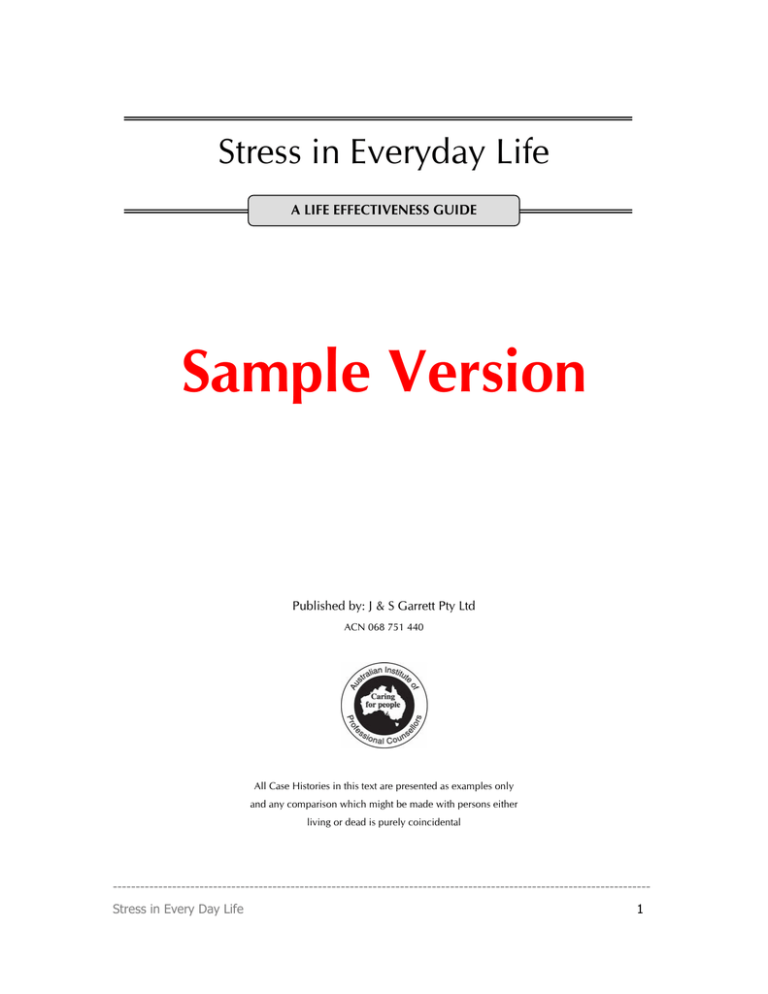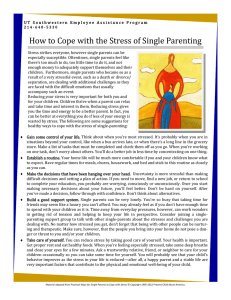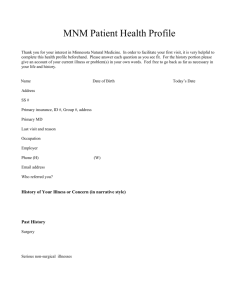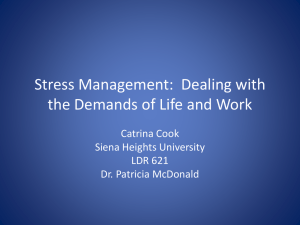stress in every day life
advertisement

Stress in Everyday Life A LIFE EFFECTIVENESS GUIDE Sample Version Published by: J & S Garrett Pty Ltd ACN 068 751 440 All Case Histories in this text are presented as examples only and any comparison which might be made with persons either living or dead is purely coincidental ---------------------------------------------------------------------------------------------------------------------Stress in Every Day Life 1 Stress in Everyday Life A LIFE EFFECTIVENESS GUIDE CONTENTS Understanding the Situation ................................................................................ 3 Different types of Stress ...................................................................................... 5 Stages of Stress .................................................................................................. 7 Identifying Symptoms.......................................................................................... 9 How to Manage Stress ....................................................................................... 10 Stress and Health .............................................................................................. 12 ---------------------------------------------------------------------------------------------------------------------Stress in Every Day Life 2 Understanding the Situation “I can’t cope anymore!” “This is too much – I’ve had it!” Is this what you are feeling right now? Comments such as these are common every day occurrences in our busy lives – and we call it STRESS. Although never quite adequately defined, vague generalisations such as “Stress and tension are normal reactions to events that threaten us” are used to describe it. Such threats can come from accidents, financial troubles and problems on the job or with family and through our emotional and physical reactions to the given situations, we become what is termed ‘stressed’. Not that long ago, the terms of worry, anxiety, fear, impatience, and anger gave way to what has been formally termed ‘stress’ and its offshoots, stressful, stress-related, and stressed-out. Further complicating matters is the fact that different people react to the same “stress” in unpredictable ways. Stress is not a diagnosis but a process happening over time. The level and extent of stress a person may feel depends a great deal on their attitude to a particular situation. An event which may be extremely stressful for one person can be a minor event in another person's life. Stress is not always a bad thing because some people thrive on it and even need it to get things done. However, when the term ‘stress’ is used in a clinical sense, it generally refers to a situation that causes discomfort and distress for a person and that is the area we will look at in this article. Regardless of who you are or what you do, chances are you spend a lot of time entrenched in the busyness of life, worrying about getting everything done, and feeling out of control. We feel obligations and pressures which are both physical and mental and the attached stress, which can be quite debilitating, is not always obvious to us. A ---------------------------------------------------------------------------------------------------------------------Stress in Every Day Life 3 recent poll found that 40 percent of people feel stressed every day and another 39 percent are sometimes stressed. Most people don't handle their stress well. They focus on the unpleasant and unexpected things that happen daily. This should just be called ‘life’; however, we need to learn to handle the stressors that life sends our way. There is a major difference between stressors - those things that happen every day that have the potential for driving us crazy, or making us angry, frustrated, and hurt, and stress - the way we choose to respond to these stressors. You make a choice about how situations will affect the rest of your day. We cannot help but allow our daily routines to take over our lives. Working, studying, running the errands, groceries, kids, deadlines, projects, budgeting - the list can go on and on. And the things that are supposed to make our lives essentially easier are the same things that often cause us the most stress. For example, think about your computer, your car, and all the gadgets in your household that just happen to breakdown right when they are most needed. Technology evolved to make our lives easier and less stressful and it is continually improving in leaps and bounds, yet we all still feel deep stress on many occasions despite great technology. Backaches, headaches, strokes, migraines, sleeplessness, anger and hostility etc. are showing us that we are more stressed than ever before. Even our hobbies and interests are stressful and demanding activities. ---------------------------------------------------------------------------------------------------------------------Stress in Every Day Life 4 Different types of Stress One of the reasons why people have a hard time ending stress is that they are not addressing the core issues within their lives. Following are six categories of stress. They are categorised so that you may first know the issue and the cause of the problem to find the solution. 1. Work/Study-Related Stress The workplace and the school are very stressful environments. Deadlines are a major cause of Work/Study Related Stress. Other factors that might contribute to this type of stress are conflict with your boss/co-workers and/or teachers, changes that happen abruptly, where you cannot cope with them, threats to job security, or a fear of having a failing mark. 2. Relationship/Family Related Stress Family related stress includes divorce/separation issues, extra-marital affairs, childrearing, teenage break ups and unwanted pregnancies among others. This area is a major stressor for most people and oftentimes, stress coming from this area can have a major impact in other areas. 3. Environment Related Stress Environment related stress is where the normal daily routine of a person is bombarded by disturbances and changes that the person cannot cope with. Disturbances include noise from the surroundings (i.e. jackhammer in a nearby construction site, traffic noise, etc.), and weather disturbances among others. Changes in the environment such as moving to a new state, having a new job or having a completely different lifestyle are stressors too. 4. Psychological Stress Psychological stress can include fear of an individual which can either be real or be a phobia which is not grounded in reality. Sleeplessness, anxieties and worries are sometimes caused by unrealistic fears which have no basis. The subconscious of a ---------------------------------------------------------------------------------------------------------------------Stress in Every Day Life 5 person and/or his/her belief systems, cultural background and social activity can all contribute to a socio-psychological stress complex. 5. Financial Stress Feelings of helplessness in financial terms are one of the most common causes of stress, and because the economic well-being of an individual is connected to other areas of his/her life, a financial problem can also have spillover effects in areas such as relationship and health. 6. Health Related Stress The health of a person is the wellspring of his life. Health related stress ranges from sleeplessness to drug abuse. Illnesses are also sources of stress. Some of the most common illnesses can be the most major stressors – such as influenza, asthma or psoriasis. These categories are not isolated from each other. Mostly, one stressor can lead to other forms of stress. The categories can mix and match to create more stress and pressures can creep in from one area of your life to another. Above all this, the degree of stress can be mild to extreme. A suffering from stress in one area could not possibly isolate this area from infecting and inflicting damage to other areas of life. ---------------------------------------------------------------------------------------------------------------------Stress in Every Day Life 6 Stages of Stress In response to the above stressful events, you can experience one, two or all of the following stages: Stage 1: Mobilisation of Energy All bodily activity is increased in response to a stressor that is frightening, such as a near car accident. This starts the body's ‘fight or flight’ reaction, causing the release of adrenalin. You feel your heart pounding and your palms feel sweaty. This is called primary stress. It can also be the result of a situation where you choose to put yourself under stress (e.g. the night before your wedding). This is called secondary stress. SYMPTOMS: • increased heart rate and blood pressure • rapid breathing • sweating • decreased digestion rate, creating butterflies and indigestion Stage 2: Exhaustion or Consuming Energy If there is no escape from Stage 1, the body will begin to release stored sugars and fats, using up its bodily resources. SYMPTOMS: • feeling driven • feeling pressured • tiredness and fatigue, an increase in smoking, coffee drinking and/or alcohol consumption • anxiety ---------------------------------------------------------------------------------------------------------------------Stress in Every Day Life 7 • memory loss • acute illnesses such as colds and flu Stage 3: Draining Energy Stores If the stressful situation is not resolved, you may become chronically stressed. The body's need for energy resources exceeds its ability to produce them. SYMPTOMS: Serious illnesses such as: • heart disease • ulcers • mental illness As well as: • insomnia (difficulty sleeping) • errors in judgement • personality changes ---------------------------------------------------------------------------------------------------------------------Stress in Every Day Life 8 Identifying Symptoms Stress is a problem when a person feels he/she cannot cope. As a condition treated clinically, stress occurs when the demands of life that persons’ experiences exceed (or they feel they exceed) their ability to cope. A variety of factors can contribute to the feeling of being 'stressed'. This may include: • Environment (work, home, school etc) • Lifestyle • Emotional issues. An individual person's attitude, personality and approach to life will influence how he/she respond to stress. The following factors all play a part: • How a person thinks about a problem • The different ways a person copes with difficult situations • Life experiences and life history • A person's self-esteem • Whether they have people around who can provide support. ---------------------------------------------------------------------------------------------------------------------Stress in Every Day Life 9 How to Manage Stress How do we cope with stress? There are literally thousands of books, articles and websites that cover stress and stress management. However, the ancient and natural ways are probably still the best ways towards peace and serenity. The old adage, 'prevention is better than cure' is certainly true for stress management. Here are some tips on how to end your daily battle with stress: • Have a healthy lifestyle - health is wealth. It cannot be stated emphatically enough. The only happiness that we can ever enjoy in this world is life, and having a great life starts with being healthy. Sometimes, people are ill equipped to face the stressors in their lives because their bodies cannot handle activities involving pain, endurance and strength. This means exercise (see note below) and eating a healthy nutritious diet. • Exercise regularly - regular exercise is a great way to manage stress. You should do some form of exercise that causes you to feel puffed afterwards. A leisurely stroll to the bus stop is not enough! Have at least 20 minutes of exercise three times a week. • Eat well - a nutritious diet is important. Eat plenty of fresh fruit and vegetables and avoid sweet and fatty foods. • Avoid conflict - avoid situations that make you feel stressed as much as you can. Avoid unnecessary arguments and conflict if you find them stressful (although ignoring a problem is not always the best way to reduce stress). • Relax - make sure you give yourself some time to relax each day and try to spend time with people who make you feel good about yourself. ---------------------------------------------------------------------------------------------------------------------Stress in Every Day Life 10 • Sleep - a good sleep routine is essential. Do something calm and relaxing before you go to bed, like listening to music, reading, or taking a warm bath if you have difficulty falling asleep. • Enjoy your life – stop to smell the roses. It's important to make time to have some fun. We get easily entangled with daily concerns. Our society seems to be heading towards self-destruction. We work all day; we even work many additional hours at our job just to get rich quickly or to help make ends meet and a lot of people forget to enjoy life in the constant surge of their busyness. Always remember that happy thoughts, and moments, make us joyful. It is good if you will learn to reward yourself from time to time. • Communicate - People who haven’t learnt to say NO, people who are unable to admit to mistakes and weaknesses are highly stressed individuals. A simple misunderstanding between you and your boss or your teacher can really make or break you. Oftentimes, it is the small things that are neglected in communication. • Prioritise - have a battle plan. Get your life in order! For a good many people it may seem hard to do this. However, the benefits to your levels of stress are huge. In financial matters, always weigh between needs and wants. According to Da Vinci, simplicity is still the ultimate sophistication – i.e. living a simple life that is free from lots of complexities. “God grant me the serenity to accept the things I cannot change, courage to change the things I can and wisdom to know the difference.” There are things which we cannot change, and there are things that have to be addressed even though going through them could be painful. Are your problems based on real issues? What things can be changed? What are the things that cannot be changed? Do you need to take it easy on yourself? ---------------------------------------------------------------------------------------------------------------------Stress in Every Day Life 11 Stress and Health You've heard the advice over and over again: You can maximise the success of your fight against disease by minimising stress. Likewise, excess stress can inhibit your body's ability to heal and your immune system's ability to suppress illness. It seems simple enough. But when it comes to stress-inducing events, only the death of a spouse or close family member, a divorce or jail term outweigh being diagnosed with a serious or lifethreatening illness. All the negative effects of life's demands and pressures are lumped together under the umbrella we call stress. It is aggravated by the uncertain prognosis and lifestyle changes that usually accompany illness or surgery. Whether you are dealing with lupus or heart disease, cancer or arthritis, you know that pain, physical limitations and decisions regarding treatment can cause frustrations which exacerbate stress levels of day-to-day living. What was once manageable now seems insurmountable after a heart attack or organ transplant. While you might be tempted to ignore stress, Valerie R. Houghton, who has counselled people with critical illnesses for 20 years, advises against it. "By applying some practical tools, you will not only decrease the level of stress in your life and improve your emotional state; you also increase your chances of survival and improve the quality of your life, such as a better night's sleep or less pain." Stress is the perception of a threat to your physical or psychological well-being and the feeling that you are powerless and unable to control that threat. It is usually associated with some unexpected change in the status quo, such as a traffic detour, a job reassignment, or a serious illness. But, according to many specialists in health care, while you may be unable to alter the situation producing the stress, you can change your perception of it and choose a more appropriate response. ---------------------------------------------------------------------------------------------------------------------Stress in Every Day Life 12 The keys to changing your perception to combat the negative effects of life's demands and pressures are found in stress reduction tools. They include: • adjusting your priorities and attitude • practicing mindfulness • relaxation techniques As with any new tools, it takes practice to learn to use these to their maximum effectiveness. You will find some to be more useful than others, and some to be awkward at first, but all of them are highly effective after repeated use. The tools that work well for you won't necessarily help someone else, and vice versa. It's important for you to test them and try to determine which tools can help you most and then put them to work. “What if, instead of running a tape projecting the worst outcome imaginable, we stop, relax and use mindfulness to deal with the pain? It's my experience, and that of many of my students, that by reducing your stress level you can reduce physical pain.” (Katie Allen, RN of Berkeley, California teaches breathing awareness and restorative yoga to people with cancer and other life-threatening conditions. She describes how her experience with cancer led her to incorporate mindfulness into her classes to help students deal with pain.) PLUS… 9 Preventing Stress 9 Tools to Minimise the Effects of Stress 9 Work-life Balance: Ways to Restore 9 Harmony and Reduce Stress 9 Humour Makes Life Easier 9 Tips to Alleviate Stress 9 And much more! ---------------------------------------------------------------------------------------------------------------------Stress in Every Day Life 13 Want More Effectiveness in Your Life? Purchase a Life Effectiveness Guide for only $29.90 and have the full version* delivered straight to your PC or laptop in a matter of seconds! Life can be challenging at times. How you deal with these challenges has an enormous impact on your happiness and wellbeing. Relationship, family, emotional and financial circumstances all influence your level of stress and your ability to cope with situations in your life. Thus, your wellbeing and ability to enjoy life can be dramatically affected. - Have you ever felt overwhelmed by problems you are facing in your life? - Do you feel like you are not handling some situations as effectively as possible? - Are you confronted with circumstances that just seem too big to cope with? Rest assured, EVERYONE experiences these challenges in their lives! It can leave you feeling powerless and overwhelmed. Your ability to cope with these challenging situations directly determines your level of wellbeing. AND YET, as you progress through life, you rarely have the opportunity to obtain the resources required to effectively and appropriately deal with these circumstances. There are currently 14 Life Effectiveness Guides in a variety of areas such as Relationships, Complex Life Situations, Parenting and Children and Complex Life Situations. To find out how YOU can learn life coping skills to live a more effective life, simply visit www.aipc.net.au/eguides and purchase your copy TODAY! *Life Effectiveness Guides average between 30-50 pages, depending on the specific guide. ---------------------------------------------------------------------------------------------------------------------Stress in Every Day Life 14


